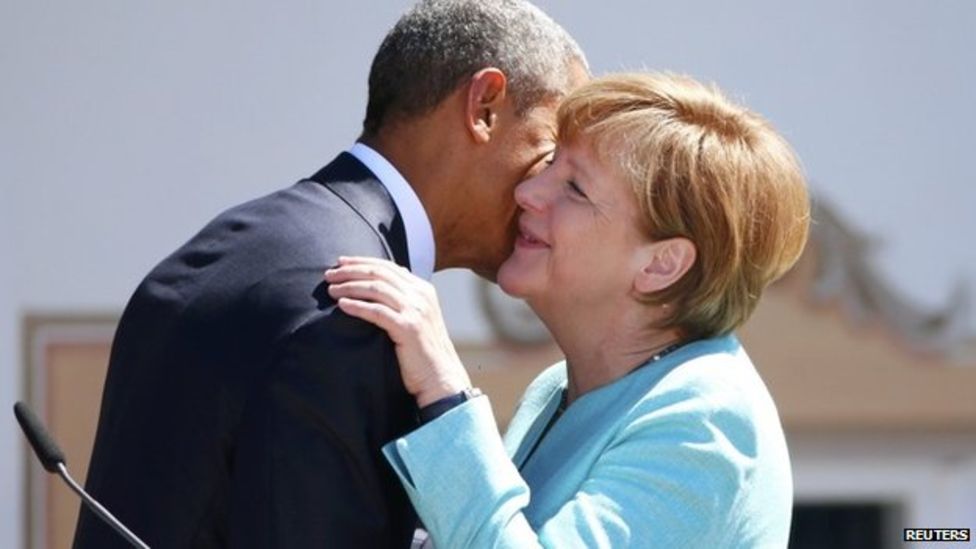G7 summit: Obama and Merkel firm on Russia sanctions

President Obama was greeted by Germany's Chancellor Merkel before they enjoyed an al fresco Bavarian meal
G7 summit: Obama and Merkel firm on Russia sanctions
President Obama was greeted by Germany's Chancellor Merkel before they enjoyed an al fresco Bavarian meal
7 June 2015
|
The US and German leaders say sanctions on Russia must stay until it implements a deal to end fighting in Ukraine.
President Barack Obama and Chancellor Angela Merkel held talks as the G7 summit of economic powers began in southern Germany.
Moscow is the target of European Union and US sanctions over its role in support of Ukrainian rebels.
Russia has been excluded from what was previously known as the G8, since the annexation of Crimea last year.
The West accuses Russia of sending military forces into eastern Ukraine to help the rebels - a charge echoed by analysts. Moscow denies this, saying any Russian soldiers there are volunteers.
As he arrived in the Bavarian Alps, Mr Obama said G7 leaders would discuss "standing up to Russian aggression" in Ukraine.
The White House issued a statement after Mr Obama's talks with Mrs Merkel, saying: "The duration of sanctions should be clearly linked to Russia's full implementation of the Minsk agreements and respect for Ukraine's sovereignty."
Germany, Britain and the US want an agreement to offer support to any EU member state tempted to withdraw backing for the sanctions on Moscow, which are hurting the Russian economy.
Last September's Minsk accord, involving Russia, pro-Russian rebels and the Ukrainian government, included the establishment of a 30km (19-mile) buffer zone between the two sides.
But fighting has intensified in recent weeks. In the latest incident, two Ukrainian coastguards were injured when a blast ripped through their patrol boat in the port of Mariupol, though the exact circumstances remain unclear.
The European Union's President of the Council of Ministers, Donald Tusk, signalled a toughening of sanctions in a statement at the G7.
"If anyone wants to start a debate about changing the sanctions regime, the discussion could only be about strengthening it."
UK Prime Minister David Cameron said he was hopeful that there would be a united front to ensure that sanctions were "rolled over" despite admitting that "sanctions are having an impact on all of us".
EU sanctions are due to expire at the end of July.
UK Foreign Secretary Philip Hammond echoed concerns about wider Russian military pressure in an interview with the BBC's Andrew Marr Show.
But, when asked if the US should redeploy intermediate-range nuclear missiles in Europe, Mr Hammond said the West had a "delicate act to perform".
"We've got to send a clear signal to Russia that we will not allow them to transgress our red lines. At the same time we have to recognise that the Russians do have a sense of being surrounded and under attack, and we don't want to make unnecessary provocations."
Russian President Vladimir Putin said on Saturday that Russia was not a threat and had "other things to worry about".
He told the Italian newspaper Corriere della Sera: "Only an insane person and only in a dream can imagine that Russia would suddenly attack Nato.
Mr Obama was greeted in the town of Kruen by Germany's Chancellor Merkel.
The two leaders then sat down to a traditional Bavarian meal of sausages and beer in the sunshine.
Greece's debt crisis and how to tackle global warming will also be on the agenda.
Ahead of the G7 gathering, thousands of protesters marched in the nearby town of Garmisch-Partenkirchen, sparking sporadic clashes with police.
Several marchers were taken to hospital with injuries, but the violence was minor compared to some previous summits.
Security is being provided by 17,000 police officers.
The other leaders at the summit are Japanese Prime Minister Shinzo Abe, French President Francois Hollande, Canada's PM Stephen Harper and Italian PM Matteo Renzi.
Mrs Merkel will also be hoping to use the summit to discuss her plans for radical reform of global responses to pandemics like Ebola.
She wants to streamline and re-focus the World Health Organization, widely judged to have been ill-equipped when Ebola hit, and build up an international reserve force of doctors and scientists for deployment in a future crisis.
Mr Cameron will unveil plans for a squad of "disease detectives" ready to fly anywhere to identify new infections.
On Monday, the summit is also due to discuss militant threats from groups like Islamic State and Boko Haram with the leaders of Nigeria, Tunisia and Iraq, who form part of an "outreach" group of non-G7 countries.
![]()
Copyright © 2015 BBC. The BBC is not responsible for the content of external sites.